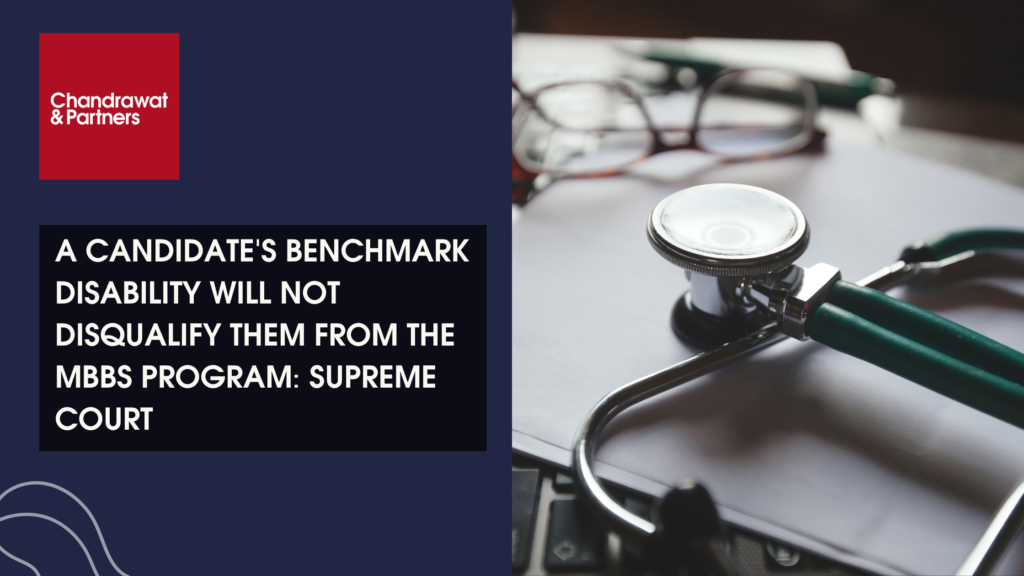Home > Recent Judgements > A Candidate’s Benchmark Disability Will Not Disqualify Them From The Mbbs Program: Supreme Court
Oct 16, 2024

A CANDIDATE’S BENCHMARK DISABILITY WILL NOT DISQUALIFY THEM FROM THE MBBS PROGRAM: SUPREME COURT
In the case between, Omkar Ramchandra Gond v. Union of India & Ors, the case involves a petitioner who was unable to admit himself in an Bachelor of Medicine and Bachelor of Surgery (MBBS) course as he had 40 to 45 % speech and language disability which as per the Graduate Medical Education Regulation, 1997, clause reflecting 40% and others disallowed. The petitioner contended that this statute was unfair with inviolable rights of disabled people Act, 2016 as well as constitutional provisions because this disability does not hinder his pursuit of further medical education. This matter attained ultimate escalation to the Supreme Court mainly because there was an appeal to the judgement of the Bombay High Court that refused to stay the cancellation of the admission, raising a more fundamental debate about the opportunities for education of the persons with disabilities.
BACKGROUND
The case concerns a petitioner who is noted to have a speech and language disability of 40-45% and who wishes admission to an MBBS program but was refused owing to Graduate Medical Education Regulation, 1997 which prohibits candidates who have more than 40% disabilities. The petitioner reasons that the regulation was violated as it was discriminatory to him per the Right of Persons with Disabilities Act, 2016 and the Constitution because his disability would not make him incapable of undergoing training in a medical education institution. The Supreme Court opined that there cannot be any prohibition on entry of a candidate into a medical college because the person suffers from a recognized benchmark of disability without the affirmative finding of incapacity by the disability assessment board. The Court permits admission of the petitioner after medical board approved regarding the fact that the disability of petitioner will not affect pursuing of the MBBS course.
ISSUE
- Whether mere quantification of a candidate’s disability (40% or above) should automatically disqualify them from pursuing medical education?
- Whether the negative opinion of the disability assessment boards should be final?
- Whether the regulation violated the principles of equality and non-discrimination under Article 14?
- Whether the petitioner’s speech and language impairment (40-45%) incapacitated him from pursuing an MBBS degree?
JUDGEMENT
The Supreme Court held that a benchmark disability rated as 40% or more, should not be sufficient to bar a person seeking for a medical education as long as there is no recommendation from the disability assessment board that such a disability hinders the candidate from completing the course. The Court said that it has been made clear on the need to determine the capacity of the candidate to undergo the MBBS course in the case personally and the board must explain why it believes the candidate is unfit in case it is so. Further, the Court took the view that the negative assessment made by a disability assessment board is not the last word as it may be constituted before the courts until the constitution of an appeal body is in place.
The Constitution Tribunal noted that the Graduate Medical Education Regulation, 1997 and its provision for blanket disqualification of individuals with 40% or more disabilities was too sweeping and possibly breaching Article 14 of the Indian Constitution, 1950. The order on the said appeal ordered the National Medical Commission in its future regulations to maintain an “inclusive attitude” and called upon the government’s agencies and private bodies to change the focus of course, candidates with disabilities integration instead of barriers against them. In the same context, it further emphasized the fact that the “reasonable accommodation’ principle of the Rights of Persons with Disabilities Act, 2016 should be adopted in these matters to ensure that persons with disabilities do so with full and equal participation within the community.”
OBSERVATION
The Supreme Court has arrived at the conclusion that a basic criterion of having a benchmark disability of 40% or more is not sufficient to disqualify a person from the MBBS course. There must be action from the disability assessment board on the question of if at all the functional degree of the disability stifles the pursuit of the said course. In case the board finds the candidate ineligible, such a decision is justified and there is a limit to how long the decision can be challenged until there is a formation of an appellate body. The Court stressed the need to ensure that the provisions of the Rights of Persons with Disabilities Act were followed and allowed admission to a petitioner with speech and language impairment, who received a positive recommendation from a medical board.
For more information or queries, please email us at
enquiries@chandrawatpartners.com




